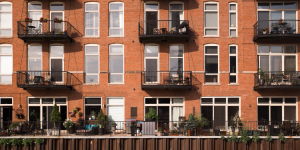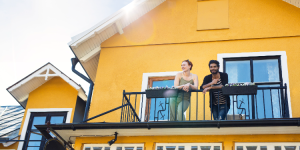
Expats and prospective expats are increasingly confronted with a severe housing crisis. Landlords are responding to market trends by offering accommodations at discounted rates, striving to stay competitive. However, this race to the bottom often carries hidden costs that exceed expectations. Here's a detailed analysis.
Shrinking living spaces
In the past, expatriates had options like dormitories, youth hostels, shared houses, and flatshares, offering a communal lifestyle at an affordable cost. Another perk was reasonably priced housing within city limits. However, as the housing crisis intensifies in urban areas, finding spacious accommodations without overspending usually requires moving away from the city center. Consequently, transportation costs emerge as a new substantial expense for expats.
Customizable apartment on offer
The rental market has expanded to include new types of affordable housing, all based on the principle of extreme segmentation. For example, in the Czech Republic, "shared apartments" are gaining traction. Typically, renters expect standard amenities such as a living space, kitchen, shower, and toilet, even in discounted apartments. However, the Czech shared apartments break this mold by dividing into several mini-apartments. Each unit may contain only a portion of these amenities, such as a bedroom and kitchenette, with showers and toilets shared communally. The housing crisis in the Czech Republic, predating COVID, continues to impact household budgets significantly.
Reduced insulation and comfort for maximum space
Countries grappling with the housing crisis have embraced similar strategies. In France, shifting away from shared living arrangements has spiked the demand for individual housing. As more people opt to live alone, the demand for housing intensifies. Developers employ various tactics to maximize space and reduce rental costs: they might expand the bedroom at the expense of other rooms, eliminate corridors and built-in closets, merge the living room and kitchen into a single area, and use thinner walls, which results in reduced insulation.
Exploring micro-living
Expats in search of accommodation are increasingly encountering the concept of micro-living. This trend includes tiny houses—minimalist, easily transportable homes. Today, the resurgence of micro-living, also referred to as micro-housing or pocket apartments, emphasizes living minimally in urban settings. In cities like Tokyo, where this concept has flourished for decades, it has also spread to other megacities such as Hong Kong, London, Vancouver, Sydney, and New York.
Expats moving to Tokyo might be familiar with capsule hotels, which offer minimal comfort in highly compact spaces where one cannot stand upright. While these are intended for short stays, Tokyo's micro-apartments are designed for long-term living, albeit for modest tenants. Some measure just 11 square meters, merging the kitchen, living room, and bedroom into one space, with a separate but equally cramped shower room included within this footprint. Despite the tight quarters and lack of insulation, such apartments typically rent for about 80,000 yen per month (around 520 USD), excluding utilities. However, more extensive options exist, averaging around 20 square meters.
Affordable housing: Navigating legal complexities as an expat
Micro-housing, shared apartments, and minimalist spaces don't inherently equate to poor quality. In fact, architects often display remarkable creativity by efficiently designing 30 square meters of living space into just 15. However, even the most vigilant can fall prey to lousy deals. Expatriates searching for affordable housing may overlook legal regulations concerning the minimum size of their accommodation, yet many countries have established such limits for even "micro" housing.
For instance, in the UK, the minimum size for a one-room studio is 6.5 square meters (about 70 square feet). In France, the requirement is slightly larger at 9 square meters. Australia demands a more generous 35 square meters for a studio. Canada's guidelines vary, defining "suitable size" based on factors including the number of occupants. In New York State, the minimum for a micro-apartment is 13.9 square meters (150 square feet), while in Tokyo, many micro-apartments average around 8.8 square meters (equivalent to 3 tatami mats). As demand for housing increases, real estate developers in cities like San Francisco and Los Angeles are scaling up mini-residence projects, seen as cost-effective solutions for accommodating lower-income residents.
However, caution is advised against potential scams. In Paris, for example, maid's rooms—often under 9 square meters—are sometimes rented out at exorbitant rates, exceeding 600 euros per month (around 650 USD). In more upscale areas, even smaller spaces can cost over 700 euros per month. Another crucial aspect to consider is insulation; living economically in a thermally inefficient space can significantly increase overall costs. Additionally, specific countries like Japan enforce stringent building standards, including those for earthquake resistance, which can affect housing design and safety.
What you should expect when searching for affordable housing abroad
Finding spacious and affordable housing in city centers is a daunting task. Expatriates aiming for more room often find better options by moving away from urban centers or considering nearby towns. Alongside the rise of innovative low-cost housing options, there has been an increase in scams by unscrupulous landlords. Expatriates, unfamiliar with local laws, are particularly susceptible to these scams. These landlords and agencies exploit expats' lack of knowledge and sometimes urgent needs by renting out substandard housing at inflated prices.
To minimize the risk of disappointment, it's crucial to thoroughly research your prospective neighborhood. Being able to communicate in the local language greatly enhances your ability to navigate the housing market. Additionally, having a reliable contact in the area can provide invaluable assistance. It is also wise to consult multiple reputable real estate agencies to compare their offerings comprehensively. While numerous legitimate, affordable housing options are available, it is up to the expatriates to discern and select their ideal home from the available options.



















